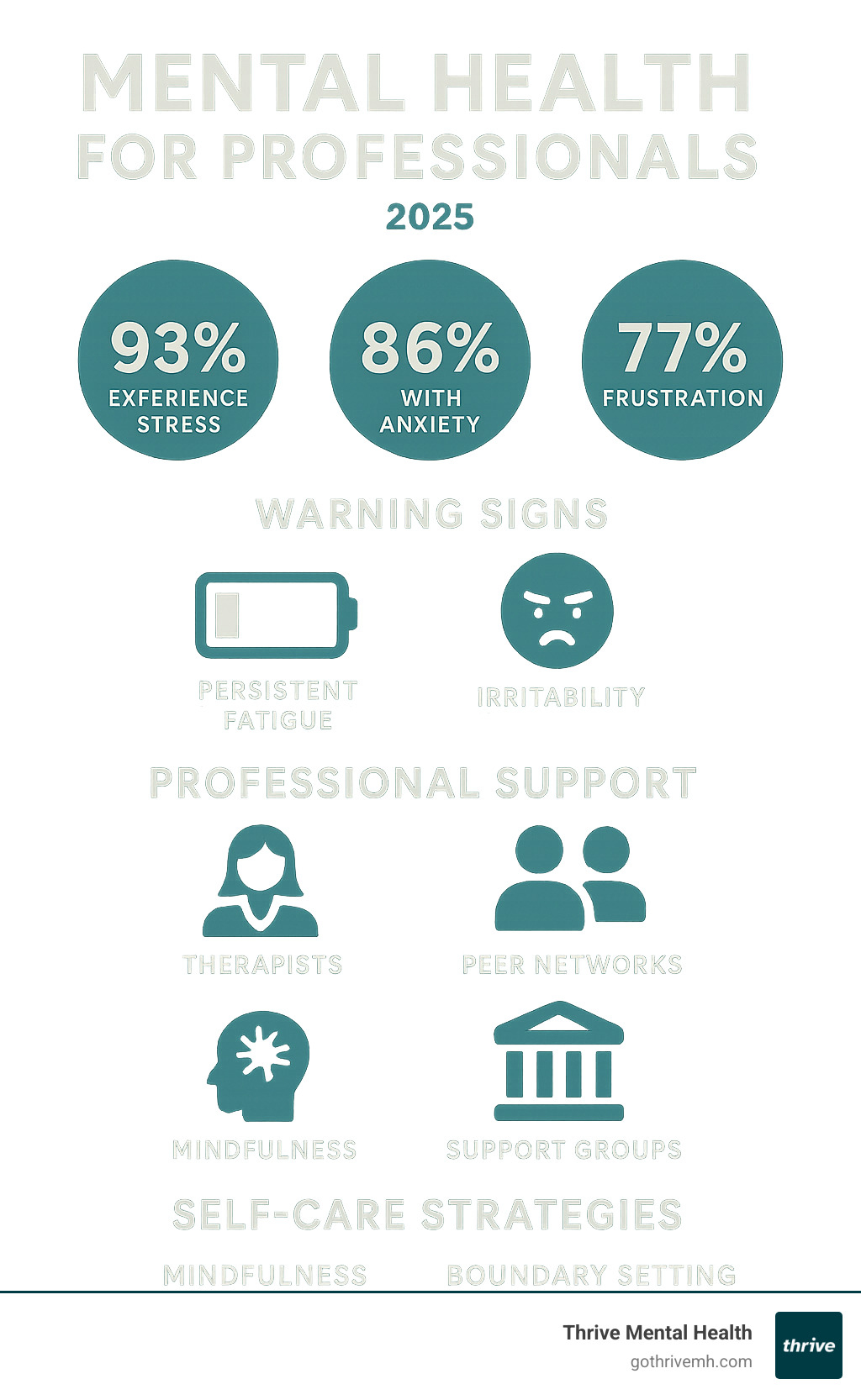Mind Over Matter: Top Mental Health Resources for Busy Professionals

Mental health for professionals: Top Tips to Thrive
Why Mental Health for Professionals Has Never Been More Critical
In Florida and across the nation, mental health for professionals is a pressing concern, especially for healthcare workers who face burnout, depression, and distress at rates far exceeding the general population.
Key Mental Health Resources for Busy Professionals:
- Crisis Support: 988 Suicide & Crisis Lifeline for immediate help
- Self-Care Strategies: Mindfulness, boundaries, sleep hygiene, exercise
- Professional Help: Therapists, psychiatrists, counselors specializing in workplace stress
- Peer Support: Professional groups, mentorship, colleague networks
- Employee Benefits: EAPs, insurance-covered therapy, workplace wellness programs
- Specialized Care: Intensive outpatient programs, virtual therapy options
Statistics are sobering: 93% of healthcare workers report stress, 86% anxiety, and 77% exhaustion. Professionals across all industries also face moral injury, compassion fatigue, and the challenge of using their person as a tool in their work.
Demanding roles, with shifting responsibilities, confidentiality, and isolation, create a perfect storm for mental health issues. Many delay seeking help due to stigma, time constraints, or not knowing where to turn.
The good news is that professional mental health is now seen as essential. More resources, from self-care strategies to specialized therapy, are available to help busy professionals across Florida thrive.
I’m Nate Raine, CEO of Thrive Mental Health. I’ve dedicated my career to creating accessible, flexible care options for busy professionals. My experience has shown me that the right resources are key to professional well-being and career sustainability.

Handy Mental health for professionals terms:
Recognizing the Warning Signs of Professional Distress
It can be hard to recognize when work stress becomes a serious problem. For mental health for professionals in demanding Florida industries, understanding this distinction is key to avoiding burnout.
Stress versus burnout isn’t just about intensity. Stress comes in waves with recovery periods. Burnout is a slow, gradual drain that leaves you running on empty, even during quiet times.
Research shows burnout has three components: emotional exhaustion (a deep tiredness sleep can’t fix), cynicism (detachment from work), and reduced efficacy (doubting your abilities).
Physical symptoms like persistent headaches, chronic fatigue, increased irritability, and difficulty concentrating are your body’s red flags.
Helping professionals face unique challenges. Moral injury occurs when you must act against your values. Compassion fatigue is the emotional cost of caring, leaving you feeling numb.
These are predictable responses to professional pressures, not character flaws. The Warning Signs and Risk Factors for Emotional Distress resource helps in recognizing these patterns.

Key Symptoms to Monitor
Professional distress creeps in gradually, so monitoring key symptoms is vital for mental health for professionals.
- Persistent fatigue that rest doesn’t fix is a primary warning sign.
- Decreased motivation makes once-energizing tasks feel daunting.
- Increased irritability can manifest as snapping at colleagues or frustration over minor issues.
- Social withdrawal means avoiding social interaction because it feels too draining.
- Changes in sleep patterns include insomnia, frequent waking, or oversleeping.
- Feeling overwhelmed by tasks that were once manageable.
- Loss of enjoyment in work that you once found satisfying is a major red flag.
- Difficulty concentrating makes even routine tasks feel complex.
- Physical symptoms like frequent headaches, digestive issues, or more frequent illness can also signal distress.
When to Seek Help
The best time to get help is before a crisis. Reach out if symptoms are escalating, persisting for weeks, or impacting your daily functioning (relationships, sleep, life outside work).
Thoughts of self-harm or hopelessness require immediate attention. This is especially critical for healthcare professionals, who face higher suicide rates. These thoughts are a sign you need care, not a sign of weakness.
An inability to cope with routine tasks is another clear signal to get help.
The 988 Suicide and Crisis Lifeline is available 24/7 for immediate support. You don’t have to be in active crisis to call—reaching out early can prevent a crisis from developing. For professionals in Florida seeking structured support, understanding your options is the next step.
Getting professional help isn’t admitting defeat. It’s investing in your long-term ability to do the work you love. To learn more, check out more info about the benefits of therapy.
Self-Help Resources: Building Resilience and Managing Stress
For professionals in Florida’s fast-paced environments, a proactive approach to mental health for professionals is essential for success. You can’t pour from an empty cup, especially in high-stakes roles.
Self-care isn’t selfish; it’s necessary. Like putting on your own oxygen mask first, prioritizing your well-being makes you better equipped to handle professional demands.
Building resilience is like strengthening a muscle; it requires consistent practice. It’s about developing tools to bounce back from challenges. Small, consistent efforts make a big difference.
Achieving work-life balance requires setting firm boundaries. This includes saying no, turning off work notifications after hours, and truly disconnecting during time off.

Key Self-Care Strategies for Mental Health for Professionals
- Physical self-care is foundational. Nutrition can be simple: eat regular meals, stay hydrated, and keep healthy snacks on hand.
- Exercise is a powerful stress-buster. Even a 10-minute walk, taking the stairs, or quick stretches between tasks can release tension.
- Sleep hygiene is non-negotiable. Create a relaxing bedtime routine, keep your bedroom cool and dark, and maintain a consistent sleep schedule.
- Emotional self-care means acknowledging your feelings. Journaling for just five minutes a day can help you process experiences and gain perspective.
- Hobbies are essential for maintaining your identity outside of work. Engaging in activities you enjoy helps you recharge.
- Psychological self-care involves your inner dialogue. Practicing self-compassion means treating yourself with the kindness you’d offer a friend.
The CDC’s Coping with Stress guide offers more strategies. Professionals in Florida can also find custom support through Thrive Mental Health’s resources for self-care and stress management.
Building Resilience in Demanding Environments
Resilience is about bouncing back from setbacks. Here are some tools to cultivate it:
- Developing a growth mindset: View difficulties as learning opportunities, not as proof of failure.
- Celebrating small wins: Acknowledge your accomplishments, no matter how small, to build confidence and motivation.
- Continuous learning: Stay curious about your field or explore unrelated topics to keep your mind engaged and combat stagnation.
- Challenging negative thoughts: When you catch your inner critic, pause and question whether the thought is true or helpful. Often, it’s overly harsh.
- Cognitive reframing: This means looking at situations differently. For example, reframe “This is overwhelming” to “I can break this down into manageable steps.” This is a key technique in Cognitive Behavioral Therapy (CBT), which helps build resilience.
Support Systems: The Power of Connection
Professional life can be lonely. Long hours and confidential work can lead to isolation. For mental health for professionals in Florida, building strong connections is an essential lifeline, not just a nice-to-have.
The risk of isolation is high when your job involves carrying others’ burdens. Building support systems is therefore critical for your well-being.
Peer support is powerful because you’re talking to someone who “gets it.” These connections offer a confidential sounding board to process experiences without judgment.
Support also comes from family, who offer a refuge from work stress. Normalizing conversations about mental health challenges helps by reducing stigma through conversation.

The Role of Peer and Social Support
Peer support connects you with others who have shared experiences, validating your struggles and reminding you that you’re not alone.
Mentorship is a powerful tool for well-being. Seeking guidance from a seasoned colleague or mentoring someone new offers mutual benefits, providing perspective and restoring a sense of purpose.
Professional associations and peer support groups provide structured ways to connect, creating communities to discuss sensitive topics and combat isolation.
Creating a network can be simple. Regular check-ins, virtual coffee breaks, or professional forums build connections. The key is to be intentional about nurturing these relationships.
How Families Can Support Professionals
Understanding work demands is key for families. Recognize that stress can’t always be left at the office, and confidentiality may prevent your loved one from sharing details.
Encouraging time off is crucial, as many professionals feel guilty about resting. Families can help by supporting vacation plans and reinforcing boundaries around work.
Providing a safe space at home allows professionals to express emotions without judgment. Being a good listener and offering support is incredibly healing.
Recognizing signs of stress like fatigue or irritability allows family to notice changes and gently encourage seeking professional help before a crisis.
Helping with practical tasks like household chores during stressful times can significantly reduce a professional’s mental load.
For families in Florida navigating particularly challenging situations, resources like Helping Children Cope With Emergencies can provide valuable guidance. If professional support is needed, exploring Central Florida counseling services can be a proactive step for the whole family.
Navigating the Landscape of Mental Health for Professionals
Finding the right mental health support can feel overwhelming when you’re already busy. Common barriers include worries about confidentiality, stigma, and the energy it takes to steer the system.
The good news is that mental health for professionals is more accessible than ever. Understanding your options is the first step.
Many employers offer Employee Assistance Programs (EAPs) with free, confidential counseling. Your health insurance also likely covers mental health services, so check your benefits.
The care landscape has evolved. You’re no longer limited to in-person therapy during business hours. Virtual options offer flexibility and privacy for professionals across Florida.
At Thrive Mental Health, we understand demanding schedules. We offer virtual and in-person intensive outpatient and partial hospitalization programs for adults and young professionals. Our approach is flexible, expert-led, evidence-based care custom to your needs and accessible anywhere in Florida. Our virtual therapy options help you integrate care seamlessly into your life.
Types of Mental Health Professionals and Their Services
When seeking support for mental health for professionals, knowing who does what helps you find the right fit faster.
| Professional Type | Ability to Provide Therapy | Ability to Conduct Assessments | Ability to Prescribe Medication | Key Focus/Role |
|---|---|---|---|---|
| Psychiatrists (MD) | Often, but not always | Yes | Yes | Medical doctors specializing in mental health; diagnose, manage medication, and may offer therapy. |
| Psychologists (PhD/PsyD) | Yes | Yes | No | Diagnose mental health conditions, provide individual/group therapy, conduct psychological evaluations. |
| Licensed Clinical Social Workers (LCSW) | Yes | Yes | No | Provide counseling and therapy, often with a focus on social and environmental factors impacting mental health; offer case management. |
| Licensed Professional Counselors (LPC) | Yes | Yes | No | Provide individual, group, and family counseling; focus on mental, behavioral, and emotional disorders; help develop coping strategies. |
- Psychiatrists are medical doctors who can prescribe medication. They are helpful for conditions that may benefit from medication management.
- Psychologists have deep expertise in mental processes and behavior. Many specialize in therapeutic approaches effective for stress and burnout.
- Licensed Clinical Social Workers (LCSWs) and Licensed Professional Counselors (LPCs) provide therapy and can offer excellent support for the challenges professionals face.
Each professional has unique specializations, such as CBT or trauma-informed care. To find the right approach for you, explore our guide to different therapy types.
Seeking Professional Help: A Guide for Mental Health for Professionals
Here’s how to find support for mental health for professionals in Florida without adding more stress.
- Start with your existing resources. Check your health insurance directory for in-network providers. Also, use your employer’s Employee Assistance Program (EAP) for free, confidential sessions and referrals.
- Ask for referrals. Your primary care physician is a great source. Trusted colleagues may also offer valuable insights into local providers.
- Use professional directories. Organizations like the American Psychiatric Association and American Psychological Association maintain searchable directories. Online platforms can also match you with a therapist based on your needs.
When considering a therapist, ask the right questions to ensure a good fit. Inquire about their qualifications, therapeutic approach, and experience with professionals in your field. Discuss confidentiality, fees, insurance, and scheduling flexibility, including virtual sessions.
The therapeutic relationship is the most important factor in successful treatment. You must feel comfortable and respected. It’s okay to find another professional if the connection isn’t right.
At Thrive Mental Health, we know the therapeutic relationship is crucial. We connect individuals with expert-led, evidence-based care custom to their needs. For more guidance in Florida, see our comprehensive guide to finding the best mental health therapist near you.
Specialized Resources for Healthcare and Mental Health Workers
In Florida’s large and demanding healthcare sector, professionals face unique challenges that go beyond typical workplace stress. The weight of mental health for professionals in these fields is particularly heavy.
Statistics show healthcare professionals face higher suicide rates. This is often due to the cumulative impact of vicarious trauma—absorbing the emotional trauma of patients.
Workplace violence and constant exposure to grief and loss add significant stress to these demanding roles. A pervasive challenge is imposter syndrome, the feeling of being a fraud despite your competence. This can be especially acute for mental health professionals.
The National Academy of Medicine’s report on Taking Action Against Clinician Burnout highlights that individual resilience isn’t enough; systemic changes are needed to support clinicians.
Overcoming Imposter Syndrome
Imposter syndrome is the feeling that you’re a fraud, despite evidence of your success. It affects countless professionals. This is especially challenging for mental health for professionals, who may question their ability to help others while doubting themselves.
- Self-compassion is a key defense. Talk to yourself as you would a friend. The Healthline article on imposter syndrome offers practical tips for developing a kinder inner dialogue.
- Tracking your accomplishments provides concrete evidence against self-doubt. Keep a record of positive feedback and successful outcomes to remind yourself of your competence.
- Seeking mentorship is transformative. Connect with an experienced professional for guidance. Hearing “I felt that way too” can be incredibly validating.
How Leaders Can Support Staff Well-being
Leaders have tremendous power to shape the mental health for professionals in their organization. Impactful change can start with small, consistent actions.
- Creating a culture of support starts with open conversations about mental health. When leaders normalize seeking help, it gives staff permission to prioritize their well-being for long-term sustainability.
- Promoting work-life balance requires action: implement policies that protect personal time, respect boundaries, and model healthy behavior. When leaders disconnect, it gives their team permission to do the same.
- Providing accessible mental health resources is key. Go beyond basic EAPs and partner with specialized providers. Thrive Mental Health offers flexible intensive outpatient programs in Florida designed for busy professionals.
- Reducing administrative burden is a powerful way to show you value your team’s time and energy. Streamline processes to reduce stress and let professionals focus on their core work.
- Open communication requires safe, confidential channels for staff to voice concerns without fear. Use regular check-ins and anonymous feedback systems to build psychological safety.
- Leadership training on recognizing distress is crucial. The APA Toolkit for Well-being Ambassadors offers guidance on spotting warning signs and connecting staff to resources.
Supporting your team’s mental health isn’t just the right thing to do—it’s also good for patient care, staff retention, and your organization’s long-term success.
Conclusion
Your journey with mental health for professionals isn’t one you have to take alone. This guide has covered the warning signs of burnout and moral injury, along with practical self-care strategies that work.
The power of connection is immense. Building relationships with understanding colleagues and family provides a lifeline during tough times.
While navigating support can feel overwhelming, seeking help is a professional superpower. Caring for your mental health makes you more effective, resilient, and sustainable in your career.
The stigma around mental health is cracking. It takes courage to admit you’re struggling and ask for help, and doing so helps dismantle the outdated belief that it’s a sign of weakness.
For professionals in Florida, Thrive Mental Health offers care that fits your demanding schedule. Our flexible intensive outpatient and partial hospitalization programs provide expert-led, evidence-based care, available virtually or in person. We offer options that work with your life.
Taking that first step toward prioritizing your well-being isn’t just good for you – it’s good for everyone you serve. Your mental health matters, and it’s time to treat it that way.
Find out more about our Intensive Outpatient Programs for professionals in Florida.